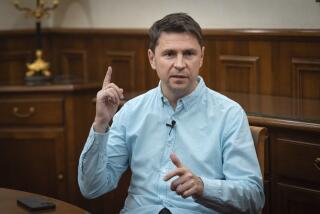Missile Defense Crucial to Arms Pact, Nitze Says
- Share via
WASHINGTON — Paul H. Nitze, chief arms control adviser to Secretary of State George P. Shultz, said Friday that the United States cannot reach agreement with the Soviet Union on the total elimination of nuclear weapons until it develops an effective missile defense system.
By tying President Reagan’s strategic defense initiative, popularly called “Star Wars,” directly to the ultimate goal of a nuclear-free world, Nitze clearly hoped to make the Reagan plan more palatable to skeptics both in the United States and abroad.
Added Obstacle
But his comments also seemed to signal serious problems for the arms talks with the Soviet Union. Outside experts believe that the Administration’s position on developing a “Star Wars” missile defense system in space, which the Soviets fervently oppose, may add to the formidable obstacles to any sort of early agreement on the more modest aim of capping the strategic arms race.
The Soviets have said that they will not implement an accord on any aspect of arms control unless there is an agreement on space weapons.
Shultz and Soviet Foreign Minister Andrei A. Gromyko agreed in Geneva earlier this month that the ultimate goal of the negotiations should be complete elimination of nuclear weapons. It was one of the few substantive matters on which both sides could concur, whenever the talks are held. United Press International, quoting diplomatic sources, reported late Friday that both sides will announce today an agreement to begin the negotiations in Geneva in mid-March.
Nitze, in a breakfast meeting with reporters, not only reiterated the Administration’s familiar position on “Star Wars”--that it will never negotiate away its right to conduct research and development on space-based missile defense systems--but took the issue one step further by saying that such a defensive system is a necessary step to the goal of complete destruction of nuclear arsenals.
Until very recently, he said, total elimination of nuclear weapons was considered an impossible dream because it would open the world to blackmail by any country that chooses to violate the treaty and obtain an instant monopoly by clandestinely producing even a few nuclear arms.
However, he said, there would be much less danger of such a “breakout” if nations such as the United States possessed integrated defensive systems capable of neutralizing all but a saturation attack.
“Today it looks as if you could have high confidence in defenses (or at least) it is not excluded that you could have high confidence in defenses,” Nitze said. He added that the United States also would need to restore its air defenses against manned bombers and cruise missiles. The technology for air defense exists now, although the United States has de-emphasized it for the last decade because the threat posed by Soviet bombers was considered insignificant in comparison to the threat from Soviet ballistic missiles--for which there has been no defense.
Nitze, one of only four senior American officials in the room during the Shultz-Gromyko talks, said the Soviet foreign minister argued that from Moscow’s point of view Reagan’s “Star Wars” plan simply looked like an effort to gain a unilateral advantage in the strategic arms race. Gromyko left little doubt that the Soviet Union’s primary objective in the negotiations was to put limits on the U.S. defensive program, Nitze indicated.
“It is hard to see how you could negotiate limits on research and development,” Nitze said. “There is no way to verify what goes on in the laboratory.”
Nevertheless, he said, Gromyko insisted that the Soviet Union would not agree to implement any arms control pact unless there is agreement in all three areas of negotiations--long-range offensive weapons, intermediate-range offensive weapons and defensive and space weapons.
If the Soviets maintain that position, it would seem to mean that no reductions in offensive weapons can be imposed until agreement is reached on the far more complex issue of space weaponry.
Nitze said the Soviets are not impressed by the U.S. claim that defensive systems are vital to any agreement calling for a nuclear-free world. Several American arms control experts from outside of government said that they believe the Administration was more concerned with public relations than with policy when it advanced that rationale for its defensive effort.
Harold Brown, former president of Caltech who was defense secretary in the Carter Administration, said, “That is an interesting theoretical concept, but if you are going after the occasional hidden weapon, you wouldn’t need a trillion-dollar space weapon.” Brown added that, in his opinion as a physicist, the strategic defense plan “is unworkable for decades and very probably forever.”
Rodney Jones, director of nuclear policy studies at Georgetown University’s Center for Strategic and International Studies, said the Administration’s objective of complete elimination of nuclear weapons combined with a defensive system to reduce the incentive for cheating has a strong appeal with the public.
“It is much easier to explain the validity of the near-term objectives if you can link them to long-term objectives that people around the world can feel unambiguously enthusiastic about,” he said.
More to Read
Sign up for Essential California
The most important California stories and recommendations in your inbox every morning.
You may occasionally receive promotional content from the Los Angeles Times.













